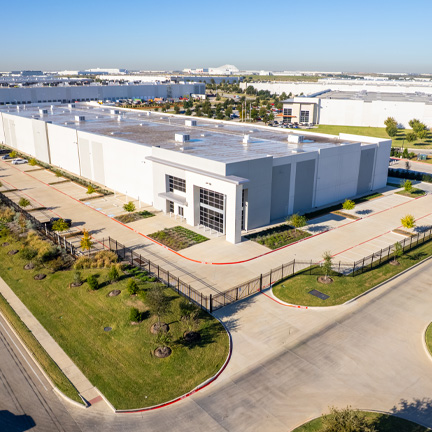Press

CenterPoint Properties Acquires Newly Constructed Fort Worth Distribution Facility
Search Site
Back to Menu

Read the feature article about CenterPoint’s expansion into the New York City metro area over the past 18 months, the robust port-proximate and parking-rich portfolio the East Coast team has assembled, the burgeoning talent pool in the New Jersey office and more in “Seeing Long-Term Upside, CenterPoint Dives Deeper into New York Area Industrial Market.”
With Well Over $200M Invested into NYC Industrial the Past Year, CenterPoint Plans Further Acquisitions in the Five Boroughs and Radius Markets
Fresh off its $117 million acquisition of 1080 Leggett Avenue, a 145,000-square-foot Bronx logistics facility, CenterPoint Properties is readying to close more acquisitions in the New York and New Jersey area, further expanding its footprint in one of the most coveted and agile industrial regions for investors right now. Seeing firsthand the types of investment decisions being made in the region by both e-commerce heavy-hitters and midsized manufacturers and vendors, CenterPoint’s East regional team sees a further fine-tuning of supply and demand fundamentals that it expects will bring strong returns over the coming years.
CenterPoint Properties, an Oak Brook, IL-based industrial real estate investor, developer, and manager, has been steadily growing its East Coast portfolio, with a strategy that prioritizes proximity to port cities, intermodal hubs, and large population centers. Its East Coast portfolio is now 17 million square feet and includes Savannah, Georgia, Charleston and Greer in South Carolina, and Miami and Fort Lauderdale, Florida. Of that 17 million square foot figure, about 7 million square feet are within New York and New Jersey. It has expanded with an office in Saddle Brook, New Jersey, and built out a team to make sure it’s as close as possible to the deals in the Northeast and along the Eastern seaboard.
The Bronx buy comes just 18 months after CenterPoint acquired a 1 million square foot, three-building portfolio on 30 acres along Foster Avenue in Brooklyn. It is currently looking to expand even further into New York in Brooklyn, the Bronx and Queens, scouring the landscape for Class A properties sized up to 1.5 million square feet that include parking, a feature CenterPoint especially covets.
“Queens is a really important borough. In a lot of ways, it is smack dab in the middle of everything, with access to all of New York City and beyond…it is high on our list,” said David Nenner, senior vice president of asset management at CenterPoint.
Of the five boroughs, Queens recorded the largest amount of first-quarter leasing, with more than 360,000 square feet signed, a 26.7% increase quarter-over-quarter, according to recent CBRE research. In comparison, New York City’s industrial leasing activity totaled about 870,000 square feet in the first quarter, a 0.3% quarter-over-quarter decrease.
To drive its expansion strategy forward, CenterPoint tapped Ronel Borner, a 15-year development veteran, as senior vice president of development. Borner was previously a director of real estate development at Rockefeller Group. The team recently brought on Mac Lee as an investment officer to help identify and secure New York metro investment deals in tandem with veteran CenterPoint employee and newly minted investment officer Bryan Won.
“We couldn’t be more excited to have that level of talent covering the boroughs for us, where there’s been deal flow like we’ve never seen before,” said Nenner.
Demand for industrial space within the five boroughs is sizzling as e-commerce companies seek to track the millennial buying power that resides there.
“Millennials are spending a great deal of money online and e-commerce firms are looking to flock to them. Mom and pops and midsize firms still need space, but are finding it harder to secure, with competition for space from e-commerce. And now, even the bigger e-commerce outlets are having to try to buy 2nd and 3rd generation buildings and repurpose them,” Borner explained.
To answer it, some developers are choosing to build multi-story warehouses on spec, but even these newer design paradigms are evolving for the unique New York market, characterized by its high population density and limited space.
“The majority of new development across Northern NJ and NYC five boroughs is speculative in nature, and the majority of new product is leased well before it is completed. New York City is an interesting story. For years it was about getting rid of industrial space and converting it into residential. Now you’re finding they want it redeveloped as multi-story industrial and even that is going speculative. We are now seeing a lot of single-story buildings in the boroughs that people are converting to Class A inside, making 22-28-foot clear buildings work because they can work within,” said Borner.
As last-mile fulfillment in the boroughs heightens immediacy with two- and three-hour delivery times, ceiling heights are becoming less important, a trend highly specific to the New York City market.
“In New York City, the usage trend can be described as a lot of new e-commerce use is more about the flow-through and the sprinter van,” said PJ Charlton, senior vice president of investments. “You used to hear so much about raising roofs, but that is not as important as it used to be. It is more about flow and having that flow be continuous. It’s affecting the way buildings are being redeveloped and making it an easier value proposition to revitalize older buildings.”
As it looks to deepen its hold in the Northeast, CenterPoint has begun a new speculative development in New Jersey at 49 Rutherford Street, which will create a 185,856 square foot facility with 45 dock doors, 80 trailer positions, 155 automobile parking spaces, and a 40’ clear- height. The property will be just a few miles from Port Newark.
“The activity we are seeing in North Jersey has been tremendous with a sub-one percent vacancy rate along the New Jersey Turnpike corridor,” said Borner. “We’re seeing interest not just from the top two or three top e-commerce giants, we’re seeing it from every size of tenant trying to grow along with them. We’re seeing demand from a wide variety of users, and we think it is just going to continue.”
As a result of this low vacancy and tight inventory in Northern New Jersey, the team is seeing more brownfield and greenfield development and the conversion of old manufacturing facilities in the area, Borner noted.
CenterPoint also recently closed on a 960,000 square foot warehouse in Lehigh Valley that marks its first bulk distribution purchase in Pennsylvania.
“As a natural extension of our Northern New Jersey and New York City foothold, the Lehigh Valley acquisition is an important deal for us. It is all about population and making sure we can empower residents in the Northeast with a stronger distribution network,” Nenner explained.
Of the $1.3 billion that CenterPoint spent on industrial investment last year, nearly 20% was spent in New York and New Jersey. As part of its New York and New Jersey activity, CenterPoint acquired seven buildings totaling more than 1 million square feet, more than 50 acres of property. The firm looks to accelerate its investments within the five boroughs, especially over the next two years.
About CenterPoint Properties
CenterPoint is an industrial real estate company made up of dedicated thinkers, innovators and leaders with the creativity and know-how to tackle the industry’s toughest challenges. And it’s those kinds of problems — the delicate, the complex, the seemingly impossible — that we relish most. Because with an agile team, substantial access to capital and industry-leading expertise, those are exactly the kinds of problems we’re built to solve. For more information on CenterPoint Properties, follow us on LinkedIn. For all media inquiries, including requests for interviews with CenterPoint executives, please contact media@centerpoint.com or 630.586.8285.
Subscribe
Microsite Request